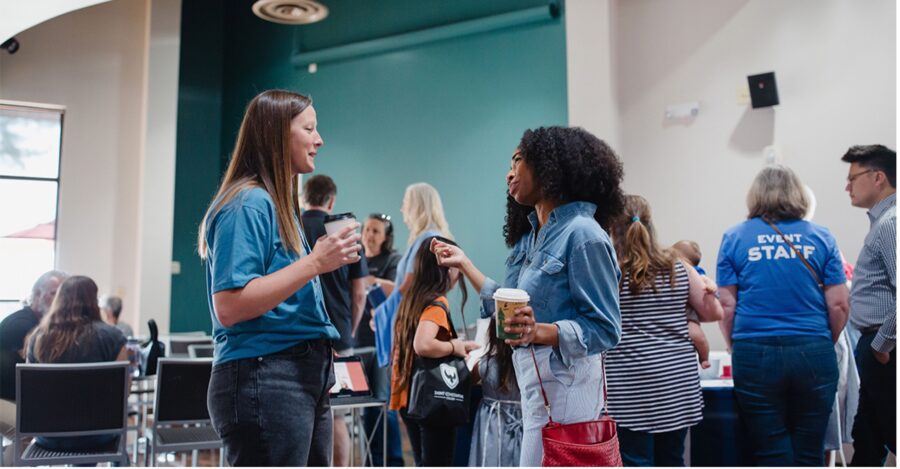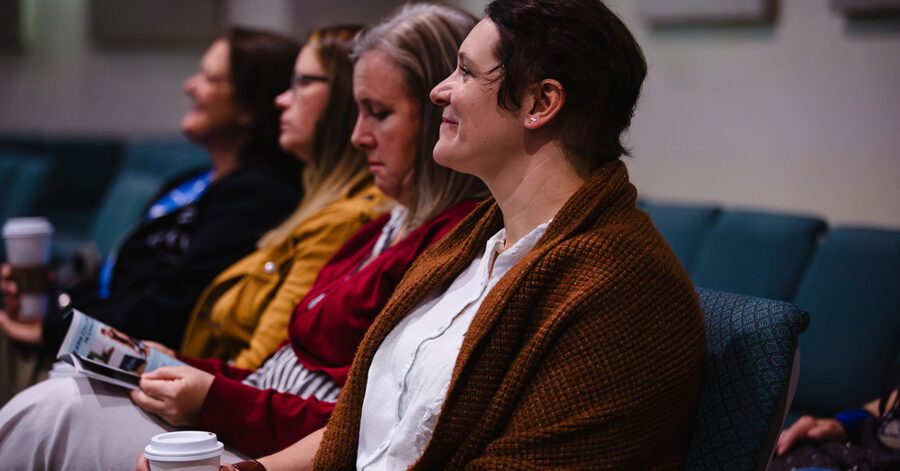Cultivating faithfulness in homeschooling begins with a beautiful truth: when we trust in the Lord and do good, His faithfulness inspires faithfulness in us. We are cultivating something precious in our homes that extends far beyond our own families. Every morning you open the Bible with your children, every lesson taught with patience, every moment you choose to trust God’s provision over your own fears, you’re cultivating faithfulness in your homeschool and passing it along to the next generation.
After homeschooling through Classical Conversations and graduating two children, Andrea Newitt discovered that faithfulness is less about what we accomplish and more about who we trust. In this article, Andrea shares that when you trust Him, you cultivate something that will flourish in your children’s lives and encourage other homeschooling families on the same journey. Your faithfulness today becomes someone else’s inspiration tomorrow.
Discovering God’s Faithfulness in Scripture
Years ago at a women’s retreat, I received a scroll with the verse “Trust in the Lord and do good; dwell in the land and cultivate faithfulness” (Psalm 37:3, NASB). Isn’t that a lovely passage? Cultivate has such a deep, rich connotation, involving growth, development, even flourishing. When I looked up the verse in my Bible, however, I discovered that in the NIV, the passage reads “Trust in the Lord and do good; dwell in the land and enjoy safe pasture.” What in the world do “cultivate faithfulness” and “enjoy safe pasture” have in common, I wondered.
For months, I meditated on the two versions of that verse. As many of you might know, to meditate on Scripture can mean to ruminate or to chew on something, as a cow chews on its cud. Therefore, that’s just what I did. During my day-to-day activities, I enjoyed my safe pasture, a happy California cow chewing on my cud of “cultivate faithfulness” whenever the verse came to mind, until one day I pictured a gardener picking flowers and passing them out to others. Then it occurred to me . . . “What if it wasn’t my faithfulness but God’s faithfulness the passage referred to?”
The Connection Between Translations
That perspective gave the verse a completely new meaning. I could finally see the connection between the two translations: God’s faithfulness provides us with safe pasture. A quick look at BibleGateway.com confirms that in the NASB the verse can also be translated as:
- “Feed securely”
- “Feed on His faithfulness”
- “Verily thou shalt be fed” (KJV)
- “Befriend faithfulness” (ESV)
The key to cultivating faithfulness is found in the first part of that verse. Notice that all four translations begin the same way: “Trust in the Lord and do good.” His faithfulness inspires faithfulness in us. In turn, our faithfulness encourages others to be faithful. Just as a gardener gives away a flower, we can pass along faithfulness to others.
Christian Homeschool Encouragement for the Journey
At times, we all could use encouragement to trust God in our homeschooling efforts. Juggling family life as a wife, a mother, and a teacher is hard. Rewards abound, but so do interruptions, conflicts, and unexpected struggles. Added doubts often creep in when we reach the high school years and worry that we are not equipped to educate our children at home. Even the most dedicated among us can be tempted to give in to fear.
Taking the time to reflect on our reasons for homeschooling and to recognize simple gifts from our loving Father can help us overcome those obstacles and follow through on our commitment, sometimes with greater ease than we expected. Through this process, we cultivate faithfulness, we become yet another family that has successfully homeschooled through high school, and we encourage others to be faithful.
A Celebration of Faithfulness
In May, we held a high school graduation ceremony for our son and older daughter. It was a wonderful celebration attended by a mixture of fellow homeschoolers and friends from our neighborhood, church, and various community activities. We set up a display table with items from our son and daughter’s more recent school days. The table was decorated in a beach theme with lighthouses, sand, and candles shaped like shells and a starfish to accompany our school name, Lighthouse Academy, and our school motto, “Let light shine out of darkness” (in Latin: de tenebris lux splendescat) from 2 Corinthians 4:6.
The evening was lighthearted, filled with laughter as well as a few tears, and a highlight for many occurred when we all marched around the room, out the door, into the hallway, and back in the other door, playing “Pomp and Circumstance” on kazoos.
My part in the ceremony was to introduce the two graduates prior to their short speeches, giving the audience a glimpse of the interests and talents my children had developed over the years. I also took the opportunity to share about the two choir songs from our church service the previous Sunday, explaining that they embodied our vision for homeschooling.
“Let Us Be Your Light” alludes to “A beacon of Your mercy” and “A light upon the hill,” and “A Song for the Nations” speaks of “A shining light” and “A word of hope.” I expressed our desire to bring light into a dark world, to let others know there is a God, a good God, who loves us and wants what is best for us.
Trust God in Homeschooling Through Trials
At the ceremony, I did not, however, share about the odd year we had just experienced. It certainly wasn’t the kind of senior year I would have chosen for my children. Late last July, I was diagnosed with breast cancer. I started my first round of chemotherapy on the Friday before Labor Day and finished the second round in mid-December. In early February, I had surgery to remove lymph nodes and what was left of the lump. I finished 6-1/2 weeks of daily radiation on the Friday before Mother’s Day.
Our Challenge IV school year was disrupted with medical appointments and a lot of resting on my part, as the treatments took their toll. I had to adjust my goals, but the year did not turn out to be an academic disaster; in fact, as my two high school seniors graduated I was able to announce at their ceremony that they were just two classes short of completing a full year of college.
He has prepared you, too, for we are His workmanship, “created in Christ Jesus to do good works, which God prepared in advance for us to do” (Ephesians 2:10).
Practical Ways to Stay the Course in Homeschooling
Biblical perseverance in homeschooling isn’t about perfection or never struggling. It’s about returning again and again to the One who is faithful when we are weak. Here are some gentle practices that can help sustain you on this journey:
- Anchor yourself in a “life verse” for your homeschool. Whether it’s Psalm 37:3, Deuteronomy 6:6-7, or another passage that speaks to your family’s calling, write it down, post it where you’ll see it daily, and return to it when doubts arise. Let Scripture be the pasture where you feed.
- Keep a simple gratitude record. On hard days, jot down one small grace—a child’s question that led to wonder, a moment of laughter, a lesson that finally clicked. Over time, these become a testament to God’s faithfulness woven through your ordinary days.
- Connect with other faithful homeschoolers. We were not meant to walk this road alone. Whether through your CC community, a church community, or even a trusted friend you text on discouraging days, let others remind you of truth when your vision grows dim.
- Remember that God’s strength is made perfect in weakness. When you feel inadequate—and you will—resist the urge to strive harder in your own power. Instead, bring your insufficiency to the Lord and ask Him to work through you. He delights in using the weak to confound the wise.
- Adjust your expectations without abandoning your calling. Faithfulness doesn’t mean rigid perfection. Sometimes it looks like gentleness with yourself and your children, like adapting your plans when life intrudes, like trusting that God’s purposes will be accomplished even through the interruptions.
- Cultivate wonder alongside knowledge. Point your children’s eyes—and your own—toward the beauty and order of God’s creation. Let your homeschool be a place where learning leads to worship, where every subject whispers of the One who made all things.
Encouragement for Christian Parents: Find Us Faithful
On Sunday our church choir will be singing “Find Us Faithful.” John Mohr’s lyrics remind us “We’re pilgrims on the journey of the narrow road.” They encourage us to leave “the heritage of faithfulness passed on through Godly lives.” Those exhortations have particular significance for us as homeschoolers and extra depth for those of us who homeschool through high school. We might sing with quivering voices of uncertainty at times, wondering if we are capable enough for the task at hand. But as our voices blend together, by faith, we become a great cloud of witnesses who do not grow weary or lose heart. When we cultivate faithfulness in our lives, we inspire a chorus of faithfulness.
Oh, may all who come behind us find us faithful.
May the fire of our devotion light their way.
May the footprints that we leave lead them to believe,
And the lives we live inspire them to obey.
Oh, may all who come behind us find us faithful.[1]
Dive into more encouragement for your homeschool journey with these resources:
- Faith, Family, and Community: The Testimony of Walker Purchase
- Is Homeschooling Worth It? A Testimony
- A Word of Encouragement for Tired Homeschool Moms
[1] Jon Mohr, “Find Us Faithful” (Jonathan Mark Music and Birdwing Music, 1987)




